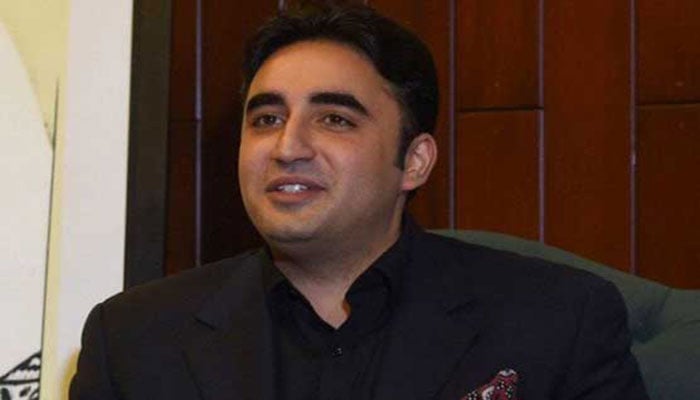IMF deal to bring country to brink of bankruptcy: Bilawal
Bilawal Bhutto says Imran Khan has pushed common people against the wall by agreeing to another one billion dollars loan from IMF
ISLAMABAD: Pakistan People’s Party Chairman Bilawal Bhutto Zardari Thursday rejected the mini-budget, presented by the PTI government in the National Assembly.
He said Imran Khan had pushed the common people against the wall by agreeing to another one billion dollars loan from the IMF.
“Imran Khan's IMF deal would bring the country to the brink of bankruptcy and people of Pakistan are paying a heavy price for the unjust nexus of PTI with the IMF," he said while rejecting the mini-budget.
He termed the imposition of tax on daily consumer products including bakery items, packaged milk, match sticks, mobile-phone calls, books, etc., a proof of Imran Khan's disregard to the common people. Bilawal said “we will not let the country plunge into lawlessness due to puppet regime's anti-people policies”.
Separately, PPP Parliamentary Leader in Senate Sherry Rehman Thursday questioned the motives behind presenting the mini budget in the National Assembly after prorogation of the Senate session.
She said that according to Article 73 of the Constitution, the copy of Finance Bill was laid in the National Assembly and its copy was presented in the Senate and it seemed that now the government would interpret Article 73 as its conscience. “Will the Senate be bypassed on a budget of more than Rs600 billion,” she said while commenting on prorogation of the Senate session.
The PPP vice president said the government did not want to talk about the finance bill in the Senate. She said the PPP had already rejected the anti-people mini budget. “The mini-budget is putting more burden on people who are already deeply affected by inflation,” she said.
Sherry said the prices of electricity, petrol, gas and essential commodities had been increased regularly. “Was that not a mini budget,” she asked. “They increase the prices and claim poor will not be affected,” she regretted.
-
 Wiz Khalifa Reveals Unconventional Birthday Punch Tradition With Teenage Son In New Video
Wiz Khalifa Reveals Unconventional Birthday Punch Tradition With Teenage Son In New Video -
 BAFTAs 2026: Kerry Washington Makes Debut In Custom Prada Gown
BAFTAs 2026: Kerry Washington Makes Debut In Custom Prada Gown -
 Jennifer Lopez Gets Emotional As Twins Max And Emme Turn 18
Jennifer Lopez Gets Emotional As Twins Max And Emme Turn 18 -
 Andrew Mountbatten Windsor Blunders Are Result Of 'conspiracy Of Silence'
Andrew Mountbatten Windsor Blunders Are Result Of 'conspiracy Of Silence' -
 Keith Urban Fires Entire Management Team After Divorcing Nicole Kidman
Keith Urban Fires Entire Management Team After Divorcing Nicole Kidman -
 Kylie Jenner Marks Death Anniversary Of Hairstylist Jesus Guerrero With '222' Tribute
Kylie Jenner Marks Death Anniversary Of Hairstylist Jesus Guerrero With '222' Tribute -
 Daniel Radcliffe On How It's Like Seeing New Harry Potter Cast Years Later
Daniel Radcliffe On How It's Like Seeing New Harry Potter Cast Years Later -
 Andrew Portrait Makes Unexpected Debut At Louvre Museum Over Epstein Protest
Andrew Portrait Makes Unexpected Debut At Louvre Museum Over Epstein Protest -
 Italy: Skeleton Of Saint Francis Of Assisi’s Goes On Public Display For First Time After 800 Years
Italy: Skeleton Of Saint Francis Of Assisi’s Goes On Public Display For First Time After 800 Years -
 Hailey Bieber's Subtle Gesture For Eric Dane’s Family Revealed
Hailey Bieber's Subtle Gesture For Eric Dane’s Family Revealed -
 Moment Prince William 'broke Down' And 'apologised' To Kate Middleton
Moment Prince William 'broke Down' And 'apologised' To Kate Middleton -
 Paul Mescal And Gracie Abrams Stun Fans, Making Their Romance Public At 2026 BAFTA
Paul Mescal And Gracie Abrams Stun Fans, Making Their Romance Public At 2026 BAFTA -
 EU Rejects Any Rise In US Tariffs After Court Ruling, Says ‘a Deal Is A Deal’
EU Rejects Any Rise In US Tariffs After Court Ruling, Says ‘a Deal Is A Deal’ -
 King Charles Congratulates Team GB Over Winter Olympics Success
King Charles Congratulates Team GB Over Winter Olympics Success -
 Meryl Streep Comeback In 'Mamma Mia 3' On The Cards? Studio Head Shares Promising Update
Meryl Streep Comeback In 'Mamma Mia 3' On The Cards? Studio Head Shares Promising Update -
 Woman Allegedly Used ChatGPT To Plan Murders Of Two Men, Police Say
Woman Allegedly Used ChatGPT To Plan Murders Of Two Men, Police Say




